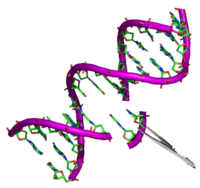
Photo from wikipedia
Mucopolysaccharidosis type I (MPS I) is a metabolic genetic disease caused by the deficiency of a lysosomal enzyme involved in glycosaminoglycans (GAGs) degradation. MPS I cells have a constant level… Click to show full abstract
Mucopolysaccharidosis type I (MPS I) is a metabolic genetic disease caused by the deficiency of a lysosomal enzyme involved in glycosaminoglycans (GAGs) degradation. MPS I cells have a constant level of GAG synthesis, but disturbed degradation means that GAGs accumulate progressively, impairing cell metabolism. GAG metabolism can be modulated by flavonoids, and these are being studied as therapeutics for MPS. We have optimised the protocol for obtaining fibroblasts and hepatocytes from the MPS I murine model and characterised the cells for their suitability as an in vitro model for testing compounds with therapeutic potential. Methods: Murine primary hepatocytes and fibroblasts were used as a cellular model to study the effect of genistein, biochanin A, and kaempferol on the modulation of the GAG synthesis process. Flavonoids were used individually as well as in two-component mixtures. There were no statistically significant differences in GAG synthesis levels from cell types obtained from either wild-type or MPS I mice. We also showed that MPS I fibroblasts and hepatocytes store GAGs, which makes them useful in vitro models for testing the effectiveness of substrate reduction therapies. Furthermore, tested flavonoids had a different impact on GAG synthesis depending on cell type and whether they were used alone or in a mixture. The tested flavonoids reduce GAG synthesis more effectively in fibroblasts than in hepatocytes, regardless of whether they are used individually or in a mixture. Flavonoids modulate the level of GAG synthesis differently depending on cell types, therefore in vitro experiments performed to assess the effectiveness of potential therapies for metabolic diseases should be carried out using more than one cell model, and only such an approach will allow for full answering scientific questions.
Journal Title: International Journal of Molecular Sciences
Year Published: 2022
Link to full text (if available)
Share on Social Media: Sign Up to like & get
recommendations!